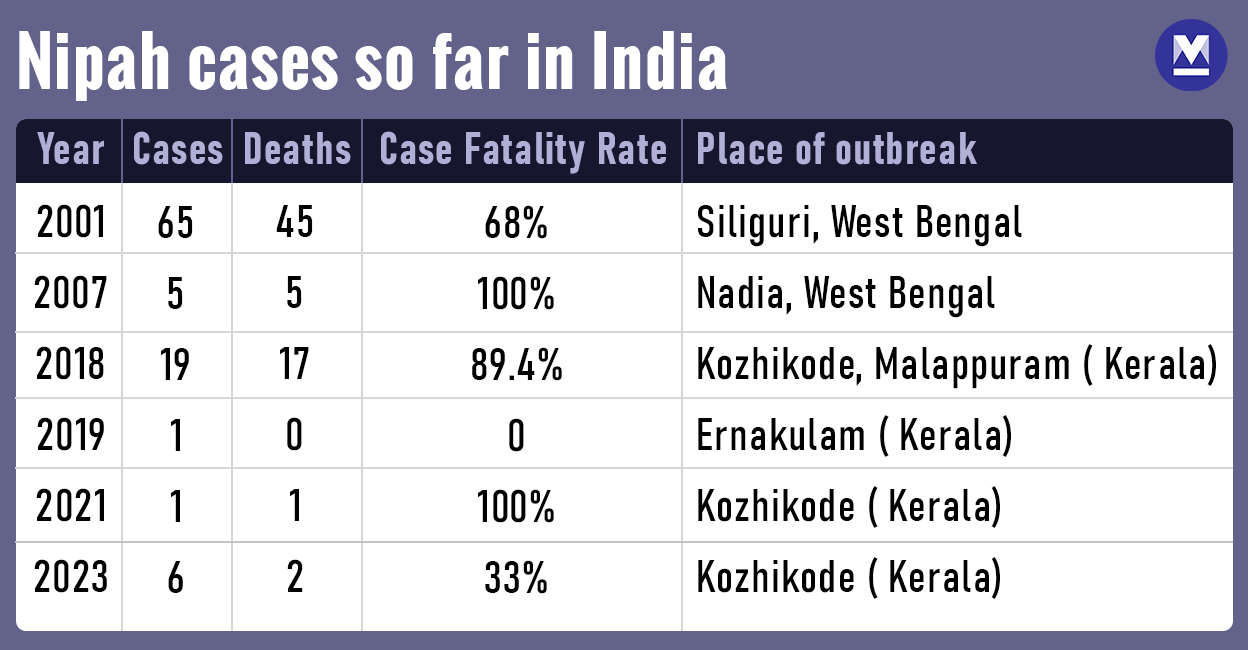Nipah outbreak: Kerala accounted for 28% of cases confirmed in India in 2 decades

Mail This Article
Thiruvananthapuram: India has reported 99 Nipah cases in more than two decades (between 2001 and 2023) and Kerala has accounted for 28 per cent of total confirmed Nipah cases in the country including the latest case in Kozhikode. A total of 71 Nipah deaths have been reported in the country to date of which 21 deaths happened in Kerala.
Kerala's case fatality rate (CFR) in the first outbreak was 89.4 per cent with 17 deaths out of 19 lab-confirmed cases in Kozhikode and Malappuram. In the previous outbreak in 2023, the CFR was 33 per cent in Kozhikode. Out of five Nipah outbreaks in Kerala so far, zero fatality was recorded once -- in 2019 in Kochi.
The Nipah management plan document prepared by the Directorate of Health Services shows that clustering of symptomatic cases, mainly adults among close contacts and households, is an important clinical clue to this infection. In the first outbreak in Kerala in 2018, all cases except the index case of transmission were from human to human.

In May 2018, there was one index patient, 18 confirmed and four probable cases. Two confirmed patients survived. The outbreak was localised to Kozhikode and Malappuram districts. Transmission of the infection occurred predominantly in the hospitals.
The human-to-human transmission rate was very high in the Kozhikode outbreak, consistent with rates of NiV outbreaks in India and Bangladesh but different from the rate in Malaysia. Several factors contributed to the high transmission rate in the hospital which included inadequate barrier infection control measures, lack of hand washing, altruistic behaviour of patient companions, poor regulation of visitors in the hospitals, extended periods of waiting for procedures and the movement of index case within the corridor, according to the document.
In the Kochi outbreak, again in May-June 2019, one patient was confirmed to Nipah but the health department managed to check further spread. Since the first major outbreak, Kerala has developed a standard operating procedure and protocol which played a significant role in controlling the spread and reducing fatality.
On August 29, 2021, a 12-year-old boy, a resident of Pazhoor ward in Chathamangalam panchayat in Kozhikode developed a low-grade fever and was taken to a nearby private clinic. On September 1, 2021, his condition deteriorated and the patient developed acute encephalitis and myocarditis. The disease was confirmed on September 4, 2021. He succumbed to infection on September 5, 2021. A total of 240 contacts were listed including 64 close contacts, according to an article on the Nipah outbreak in 2021 in Kerala published on Front Public Health.
According to the WHO note, between 12 and 15 September 2023, a total of six laboratory-confirmed cases of Nipah virus infection including two deaths were reported in Kerala. All confirmed cases were males within the age range of nine to 45 years old and were reported within Kozhikode.
The first case. whose source of infection is unknown, had pneumonia and acute respiratory distress syndrome (ARDS) and was admitted to a hospital in late August 2023. He died a few days after admission.
The other five confirmed cases were close contacts of the first case including two family members and contacts at the hospital where the first case was treated and died. The second death occurred in an individual who accompanied another patient to the hospital where the first case was being treated. He died after presenting with symptoms of pneumonia.
Health officials traced contacts of the 1,288 confirmed cases, including high-risk contacts and healthcare workers who treated the confirmed cases and processed their samples.

